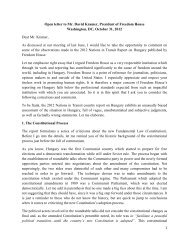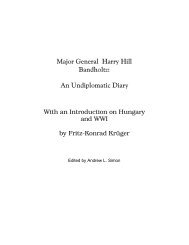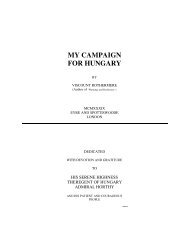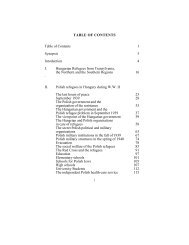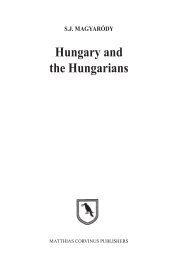The Fate of Western Hungary 1918-1921 - Corvinus Library ...
The Fate of Western Hungary 1918-1921 - Corvinus Library ...
The Fate of Western Hungary 1918-1921 - Corvinus Library ...
You also want an ePaper? Increase the reach of your titles
YUMPU automatically turns print PDFs into web optimized ePapers that Google loves.
Austria – who were ineligible to vote, e.g.- people who were temporarily<br />
staying in Sopron or have had some connection in the past to the plebiscite<br />
area. <strong>The</strong> Austrian agents went from house to house, checking the accuracy <strong>of</strong><br />
the lists, reviewing the referendum rolls. A separate committee was formed to<br />
review the new data, which, due to the shortage <strong>of</strong> time, was only able to<br />
review and correct only a tenth <strong>of</strong> the lists by December 13 – according to<br />
Victor Miltschinsky, Austrian referendum commissioner. 496 “<strong>The</strong> number <strong>of</strong><br />
electoral irregularities could not have been great since the Austrians began<br />
checking the voter lists already on December 4 and were joined by Entente<br />
<strong>of</strong>ficers on December 6.” 497<br />
In the situation that developed, there was, indeed, a small amount <strong>of</strong><br />
uncertainty and the Austrian government chose attack as the best defense. It<br />
urged the delay <strong>of</strong> the referendum until December 18 with the Council <strong>of</strong><br />
Ambassadors in Paris, the Entente countries’ ambassadors in Vienna, and the<br />
French and Italian governments. It based the request on the fact that Hungarian<br />
security forces left the area on the 12 th , that the electoral rolls were forged, and<br />
that the plebiscite would not take place in a free and unbiased atmosphere. <strong>The</strong><br />
Council <strong>of</strong> Ambassadors assented to the extent that it transferred the decision to<br />
the Entente generals in Sopron. <strong>The</strong>y, in turn, made the delay contingent on the<br />
written agreement to the delay <strong>of</strong> the Hungarian government and PM Bethlen.<br />
<strong>The</strong> Hungarian government rejected the delay, saying it could make no more<br />
concessions to Austria. This view was also supported by the Entente<br />
ambassadors in Budapest. On the day <strong>of</strong> the withdrawal <strong>of</strong> Hungarian security<br />
forces, the 12 th , the Austrian government notified the Entente generals in<br />
Sopron: it would take no part in the plebiscite starting on the 14 th , and<br />
instructed its representatives to leave Sopron. On the evening <strong>of</strong> the same day,<br />
its decision was communicated to the Entente ambassadors in Vienna, as well<br />
as its decision not to recognize the result <strong>of</strong> the people’s will.<br />
<strong>The</strong> Sopron plebiscite, compelled by the <strong>Western</strong> <strong>Hungary</strong> insurrection<br />
begun on August 28, <strong>1921</strong> and the proclamation by Pál Prónay <strong>of</strong> an<br />
independent state <strong>of</strong> Lajta-Banate on October 4, ended favorably for <strong>Hungary</strong>.<br />
In his report afterwards, Frigyes Villani grasped the substance <strong>of</strong> it: “<strong>The</strong><br />
logical progress <strong>of</strong> events could lead to no other solution than that Sopron was<br />
to stay with <strong>Hungary</strong>. From the moment that the Hungarians defied the totally<br />
authorized entrance <strong>of</strong> the Austrians in August <strong>of</strong> <strong>1921</strong>, and the Allied powers<br />
omitted, from the very first days, to take military action to back up the terms <strong>of</strong><br />
the peace agreement, Sopron could be said to be lost to Austria.” 498<br />
<strong>The</strong> plebiscite was held on December 14 in Sopron and on December 16 in<br />
the surrounding eight villages, under the strict supervision <strong>of</strong> the Entente<br />
representatives. <strong>The</strong> number <strong>of</strong> eligible voters was 27,069, the majority <strong>of</strong><br />
496 Miltschinsky, Victor: Das Verbrechen von Ödenburg [<strong>The</strong> crime perpetrated on<br />
Sopron]. Wien, 1922, pp. 61–79.<br />
497 Ormos, 1990, op. cit., p. 195.<br />
498 Villani, 1923, op. cit., pp. 30–31.<br />
193




